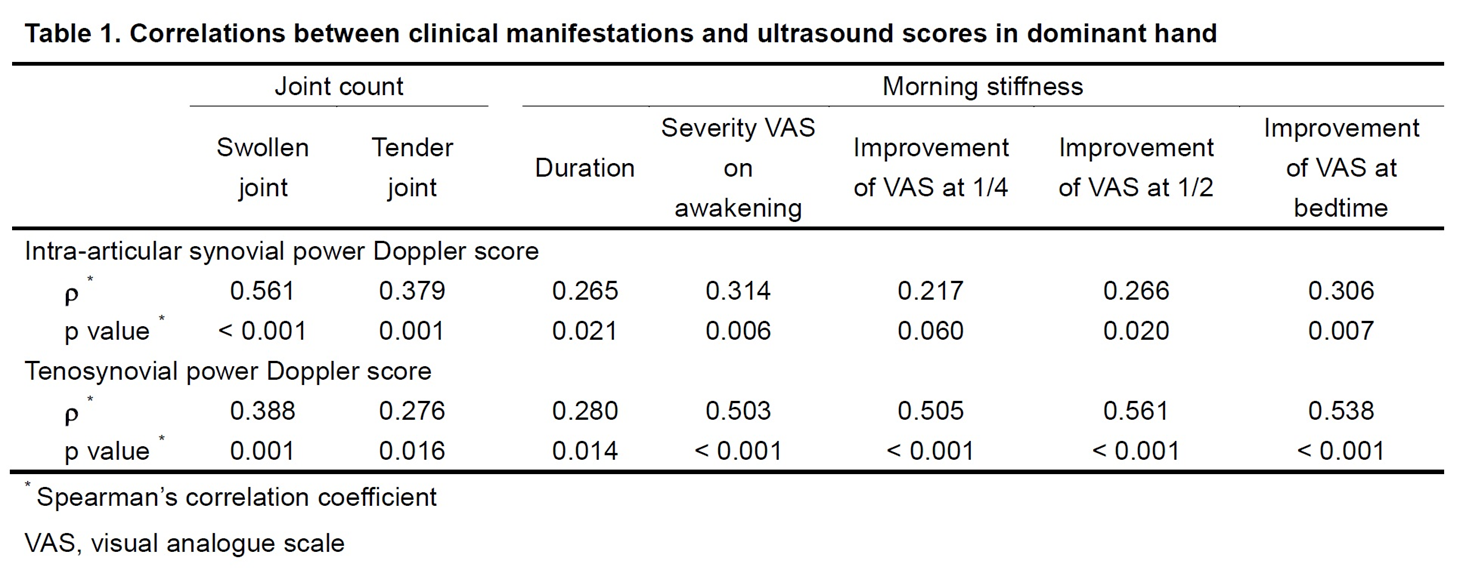Session Information
Date: Monday, November 14, 2016
Title: Imaging of Rheumatic Diseases II: Ultrasound in Rheumatoid Arthritis
Session Type: ACR Concurrent Abstract Session
Session Time: 2:30PM-4:00PM
Background/Purpose:
Morning stiffness has long been recognized by both patients and rheumatologists as a characteristic feature of rheumatoid arthritis (RA). However, morning stiffness is no more included in 2010 ACR/EULAR Classification Criteria for RA or in major instruments for evaluating disease activity of RA such as Disease Activity Score (DAS), ACR Core Set, Simplified Disease Activity Index (SDAI), and 2011 ACR/EULAR Provisional Definition of Remission for the lack of solid evidence for its independent value. In this study, we aimed to clarify the associations between morning stiffness and synovial inflammation and determine the independent value and the optimal measurement of morning stiffness in patients with RA.
Methods: We enrolled 76 consecutive RA patients who underwent musculoskeletal ultrasound and agreed to participate in the study. In addition to asking the duration of morning stiffness, we asked patients to complete a diagram which represents the time course of their morning stiffness in the dominant hand. We also determined the activity of synovitis in 11 joints and tenosynovitis in 8 tendons/tendon compartments in the same hand by using power Doppler (PD) ultrasound with a semiquantitative score (0-3).
Results: Study patients were predominated by women (78.9%) with a mean age of 58.4 (SD 14.6) years and a median disease duration of 24 (IQR 8-63.75) months. Rheumatoid factor (RF) and anti-citrullinated protein antibody (ACPA) had been positive in 84.2% and 77.6%, respectively. For synovitis, swollen/tender joint counts more strongly correlated with total PD scores (r = 0.379-0.561, p ≤ 0.001) than did any parameters of morning stiffness (r = 0.217-0.314, p = 0.006-0.021) (Table 1). For tenosynovitis, however, the severity on awakening and the improvement of morning stiffness more strongly correlated with total PD scores (r = 0.503-0.561, p < 0.001) than did swollen/tender joint counts (r = 0.276-0.388, p = 0.001-0.016) (Table 1). Multivariate analyses identified the severity on awakening and the improvement but not the duration of morning stiffness as factors that independently associate with the total tenosynovial PD score. 
Conclusion: Our data demonstrate a pathophysiological link between morning stiffness and tenosynovitis and also give an insight into the optimal measurement of morning stiffness. Our data support an independent value of evaluating morning stiffness in the management of RA.
To cite this abstract in AMA style:
Kobayashi Y, Ikeda K, Nakamura T, Yamagata M, Nakazawa T, Tanaka S, Furuta S, Umibe T, Nakajima H. Severity and Improvement of Morning Stiffness Independently Associate with Tenosynovitis in Patients with Rheumatoid Arthritis [abstract]. Arthritis Rheumatol. 2016; 68 (suppl 10). https://acrabstracts.org/abstract/severity-and-improvement-of-morning-stiffness-independently-associate-with-tenosynovitis-in-patients-with-rheumatoid-arthritis/. Accessed .« Back to 2016 ACR/ARHP Annual Meeting
ACR Meeting Abstracts - https://acrabstracts.org/abstract/severity-and-improvement-of-morning-stiffness-independently-associate-with-tenosynovitis-in-patients-with-rheumatoid-arthritis/
